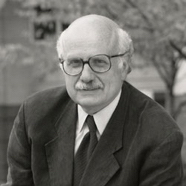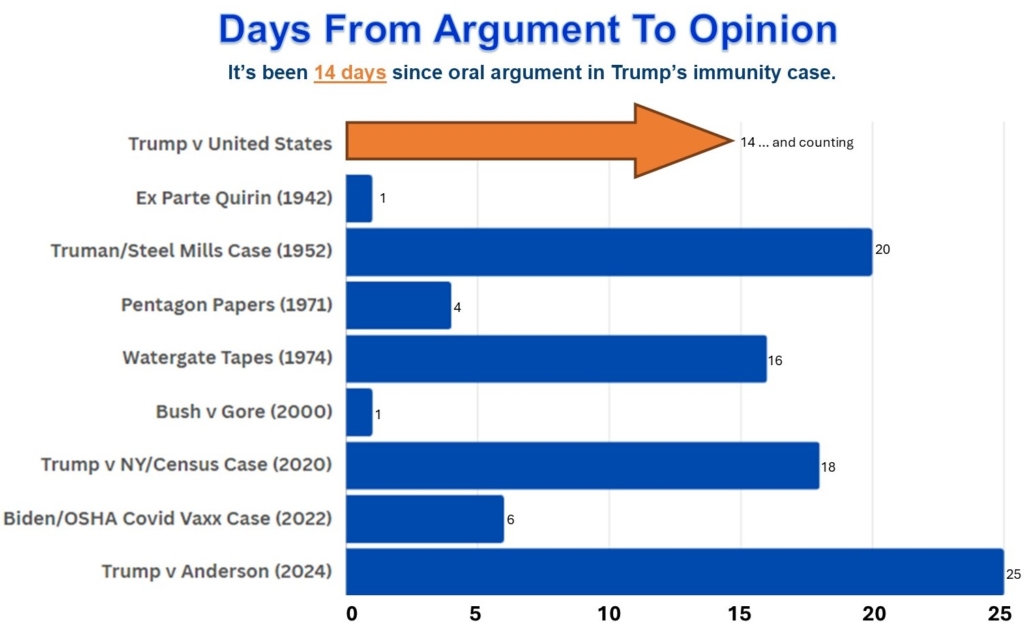Delay Is Working For Trump In 3 Of His 4 Criminal Cases
 It’s been 14 days since the Supreme Court heard oral argument in Trump v. United States, the criminal case brought against former President Donald Trump who is charged with attempting to overturn the 2020 presidential election.
It’s been 14 days since the Supreme Court heard oral argument in Trump v. United States, the criminal case brought against former President Donald Trump who is charged with attempting to overturn the 2020 presidential election.
This is arguably the most important criminal case in American history.
The case deals with the alleged first attempt at a presidential coup in this country, a violent mob attack on the Capitol, and the first ever disruption of the peaceful transfer of power.
Trump’s legal strategy in this and in his three other criminal cases has been clear to everyone, including the nine Supreme Court Justices – delay any trials until after the November election.
Then, if Trump wins, he will order the Justice Department to drop the two federal cases against him – the attempted coup case and the Mar-a-Lago classified documents case – and file objections to any state cases.
The delay strategy has not worked in the current Manhattan criminal trial charging Trump with paying hush money to an adult entertainer in order to interfere with the 2016 presidential election.
But, Trump has been successful with his delay strategy in the other three cases.
In the Mar-a-Lago classified documents case – first brought nearly a year ago and thought to be a very strong case – Trump has drawn Judge Aileen Cannon, who gives every appearance of being “all in” on Trump’s delay strategy. She has been twice reversed and rebuked by the Eleventh Circuit Court of Appeals for issuing indefensible decisions favorable to Trump. Since then, she appears to be slow walking the case to the point where it no longer seems possible that a trial will occur before the election.
In the Georgia 2020 election interference criminal case, Trump has benefited from delays caused by a controversy created by Fulton County D.A. Fani Willis’s personal relationship with Nathan Wade, a lead attorney she hired for the case. While the presiding judge did not find a sufficient conflict of interest to remove Willis from the case, he did find a “significant appearance of impropriety” and ordered either Willis or Wade to leave the case, which Wade did.
Trump appealed and this week the Georgia Court of Appeals accepted Trump’s appeal, which all but ends any possibility of a trial before the election.
Meanwhile, the Supreme Court has done its part to delay the attempted coup case by refusing a request, made last December by Special Counsel Jack Smith, that the Court grant an appeal directly after federal district court Judge Tanya Chutkan ruled that Trump does not have absolute immunity for acts taken while President.
The Supreme Court, taking a leisurely approach, ultimately granted an appeal in February after the D.C. Circuit Court of Appeals upheld Chutkan’s ruling. The Court heard oral argument on April 25.
There are two problems if this trial is delayed until after the election.
⮞ First, citizens are entitled to know before they vote in November whether Trump, the presumptive Republican nominee, is or is not a convicted felon for his role in the effort to overturn the result of the 2020 presidential election.
⮞ Second, as mentioned above, if Trump is elected, he will order the Justice Department to immediately drop the case.
In a number of past consequential cases, the Supreme Court recognized the need for speedy action, issuing decisions 25 days or earlier following oral argument.
___________________________________________________________________________________

As of May 9, it’s been 14 days since the Supreme Court heard oral argument in the Trump immunity case.
___________________________________________________________________________________
For example, in the Pentagon Papers case, New York Times Company v. United States, the Court in 1971 issued its opinion, including concurring and dissenting opinions, just four days after oral argument.
In the Watergate tapes case, United States v. Nixon, the Court in 1974 issued its unanimous opinion just 16 days after oral argument.
In this year’s Colorado presidential primary ballot case, Trump v. Anderson, in which the Court ruled favorably for Trump, this Court issued its opinion, including a concurring opinion, on March 4, just 25 days after oral argument.
In this current case, it’s expected that the Court will reject Trump’s argument that he is entitled to absolute immunity, but will send the case back to the lower court to determine which parts of the Trump indictment involve potentially immune official presidential acts and which parts are private acts and not immune from prosecution.
If there is any chance for a trial before the election, the Supreme Court must do no worse in issuing its opinion than it has done in other consequential cases, in particular in its favorable Trump opinion in the Colorado ballot case issued just 25 days after oral argument.
That date would be Monday, May 20.
Going beyond that date creates increasing suspicion that one or more Justices are slow walking this case in support of Trump’s efforts to push his trial beyond the election.
____________
Fred’s Weekly Note appears on Thursdays in Wertheimer’s Political Report, a Democracy 21 newsletter. Read this week’s and other recent newsletters here. And, subscribe for free here and receive your copy each week via email.